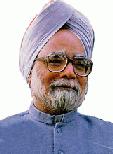Interview/Manmohan Singh
The Stock Markets and the Scam
 Moving away from privatisation, one of the areas in which middle
class people were most disappointed in you was the stock market.
What went wrong?
Moving away from privatisation, one of the areas in which middle
class people were most disappointed in you was the stock market.
What went wrong?
The main problem was the scam. And the second problem was
the way we handled it. For two years, the JPC was sitting. Also
the legal process is such that it takes long. That prolonged the
uncertainty for far too long.
But the middle class invested because people trusted you and
they took your optimism as a signal to invest. Do you regret the
optimism?
But for the scam, the markets would have given the results
people expected. Even then when we left, the market was close
of 4000 (points).
If we handled the scam in this way, it would have been much better.
In most other countries when you come across irregularities -
let us say, the collapse of Barings - the first thing to do is
to find a quick settlement.
In our country, you have all these controversies. Parliament gets
in on the act. Uncertainty is prolonged. People don't take the
decisions they should. And it hurts economic activity.
You've attributed the scam to systemic failure. What exactly
does that mean?
The scam was going on from 1986. It was characteristic of
a very segmented market. There was too much control but these
controls simply were not very effective.
You forced banks to devote 60 per cent of their resources to below-market
rate lending to government. Naturally they would then be under
pressure to find ways and means of keeping their heads above water.
In the mid-1980s, public enterprises were allowed to raise money
in the market. Many of them operated without any discipline and
raised money far in excess of their needs. And here were the banks
who promised them attractive returns if they diverted the money
- in violation of existing rules - to the stock market. From 1986
to 1991, the average rate of return on the stock market was around
40 per cent.
Therefore the scam was a product of a highly controlled, segmented
financial system. It was like water finding its own level.
A lot of people saw the scam as a consequence of the liberalised
market...
But actually, it was caused by the opposite. It was caused
by too many controls. We didn't take a single decision about the
financial markets till March 1992. And the scam was well under
way by then.
Did you have any idea of the scam before it broke?
Honestly, in the first eight months, I was totally obsessed
with macro-management. Everyday we face the prospect of bankruptcy.
Then, these complex negotiations with the Fund and the Bank took
up most of my time.
Then, by March when the scam came to notice, I spent the next
two years coping with that and facing the Joint Parliamentary
Committee. (Laughs).
The resignation
You resigned when the JPC report was submitted. You've never
really explained why you did that.
Even though the JPC could not find any way to blame me personally
for anything, they held the finance ministry responsible.
I think they did not give adequate recognition to the fact that
we were in a grave crisis and most of my time was devoted to this
crisis. Frankly speaking, I feel they should have recognised that
the scam was not because of anything I did. It had been going
on from 1986.
When we came to know about it, we took prompt action. We confiscated
the properties of those involved. The CBI was brought in.
Despite all this, the JPC found it necessary to blame the finance
ministry.
I felt that as it was a unanimous report, it was my moral duty
to tender my resignation even though they could not find one instance
to blame me personally.
Were you in any way disappointed by the response to your resignation?
The prime minister took two days to get back to you after you
submitted your resignation.
No, there was no response for seven days. (Smiles).
No, I meant that he spoke to you after two days. But yes, it
took him seven days to actually say something. And for those seven
days, the country was not sure whether we had a finance minister.
Why did you eventually withdraw your resignation?
When the prime minister said that I continue to enjoy his
confidence, I felt I had made my point. There was no need to push
the point any further.
But you hadn't resigned because of any dispute with him. Why
should it matter that he made a public statement about his confidence
in you?
There was a JPC report and at that time I felt that the Congress
members should have recognised that there was nothing that I particularly
did that contributed to the scam.
So it was important for the prime minister to make it clear that
I still enjoyed his confidence and that I was not an embarrassment
to the party or the government.
I was engaged in this massive effort to rescue our country - working
22-24 hours a day - so I could not take interest in every aspect
of the running of the country's financial system. If they were
not going to recognise that, then I did not want to be a source
of embarrassment to the prime minister.
|





 Moving away from privatisation, one of the areas in which middle
class people were most disappointed in you was the stock market.
What went wrong?
Moving away from privatisation, one of the areas in which middle
class people were most disappointed in you was the stock market.
What went wrong?